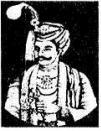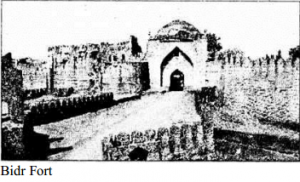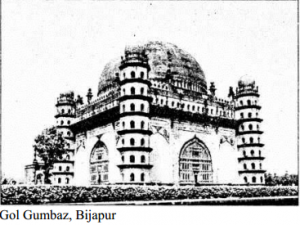Students can Download History Chapter 4 Vijayanagara and Bahamani Kingdoms Questions and Answers, Notes, KSEEB Solutions for Class 9 Social Science helps you to revise complete Karnataka State Board Syllabus and score more marks in your examinations.
Karnataka State Syllabus Class 9 Social Science History Chapter 4 Vijayanagar and Bahamani Kingdoms
Class 9 Social Science Vijayanagar and Bahamani Kingdoms Textual Questions and Answers
I. Fill in the blanks with suitable words.
Question 1.
Vijayanagar empire was established in the year __________
Answer:
1336 A.D.
Question 2.
The Madhuravijaya was written by ___________
Answer:
Gangadevi.
Question 3.
Praudhadevaraya’s minister was ___________
Answer:
Timmarasa
![]()
Question 4.
The king who wrote Amukta Malyada in Telugu was __________
Answer:
Krishnadevaraya.
Question 5.
Madarasa at Bidar was established by ___________
Answer:
Mohammad Gawan.
Question 6.
The Kitab-E-Navarasa was written by _____________
Answer:
Ibrahim Adil Shah II.
II. Answer the following questions after discussing with your group :
Question 1.
Name the four dynasties who ruled Vijayanagar empire.
Answer:
The four dynasties that ruled Vijayanagar are : (i) Sangama, (ii) Saluva, (iii) Tuluva, (iv) Araveedu.
Question 2.
What were the achievements of Devaraya II ?
Answer:
The achievements of Devaraya II were as under :
- He defeated king Gajapati Kapilendra of Orissa. By suppressing the regional leader of the border and expanded the Kingdom upto Krishna river in the North-east.
- He was tolerant towards other religions. He constructed mosques, Jain and Vaishnava temples.
- He patronized many Sanskrit scholars in his court.
- During his period Veerashaiva tradition and literature saw a revival.
![]()
Question 3.
What were the problems Krishnadevaraya had to face when he ascended the throne ?
Answer:
The problems Krishnadevaraya had to face when he ascended the throne are:

- The kingdom of Vijayanagar was besieged by various complex internal and external problems.
- The Europeans has established colonies.
- The Moghuls of the north were trying to expand their kingdom in the Southern region.
- The five Shahi Kingdoms of the Bahamani dynasty became powerful Sultanates and plunged into wars against Krishnadevaraya.
- The kings of Ummatthur and Orissa were a constant source of threat.
Question 4.
What are the contributions of Vijayanagar empire to the economic system and society ?
Answer:
The contributions of Vijayanagar are :
- Vijayanagar was economically prosperous, because the kings brought many reforms in agricultural and industrial fields.
- The kings constructed wells, tanks and canals to encourage irrigation and agriculture.
- They brought five kinds of practices of land holdings like genl,guttige,siddhaya,vara and gadi.
- The Vijayanagar empire achieve a great progress in the field of industry and commerce.
- They brought coins of different denominations; the gold coins, gadyana, ‘pagoda, silver coins and copper coins in using for exchange.
- The kings maintained trade relation with foreigners for the economic development. Spices like peppar, cloves, cardamom, saltpere, iron ore, sandal perfume,etc.were exported by them.
Question 5.
Describe the art and architecture of the Vijayanagar period.
Answer:
Excellent works done by Vijayanagar kings in the fields of art and architecture is memorable. The unique of their architecture was the construction of huge auditorium and marriage halls. Temples had huge towers, leaf-shaped archies and platforms. Rough granite stone was used for construction of these structures.
Vijayanagar kings built many temples in Hampi, Shringeri, Tirupati, Lepakshi, Karkala, Moodabidri, Kanchi, Shrishail, Kalahasti. Vittal temple of Hampi is known for its magnificent architectural beauty. The Saptaswara musical pillars, huge Kalyana mantaps and the Stone Chariot enhanced the beauty of the temple. Kamal Mahal, Elephant stable, Queen’s bath are the wonderful examples of Indo-Muslim architectural style.
Laxminarashima, Kadalekalu Ganesha, Sasuvekalu Ganesha idols are magnificent architectural examples.
Question 6.
How can Gawan be considered as the best Prime Minister in Bahamani dynasty?
Answer:
As a Prime Minister, Mohammad Gawan, he took the Bahamani Kingdom to great heights. He learned Muslim religious verses and law at Kairo. He gained proficiency in Arab and Parsi languages. He was responsible for enhancing the glory of the Bahamani kingdom by his efficient administration and victories. He conquered Konkana, Goa, and Belagavi. He invaded Kanchi and plundered its huge wealth. Thus Mohammad Gawan, as a prime minister of Bahamani kingdom was responsible for all-round development of the kingdom.
Another important achievement of Gawan was that he established a madrasa (College) at Bidar to encourage the study of Islamic religion and laws. The building of the college was magnificent construction in the Deccan style. In administration, he brought much remorse also.
![]()
Question 7.
Describe the administration and revenue system during the rule of the Bahamani sultans.
Answer:
There were three levels of administration during the rule of Bahamani Sultans, namely Central, Provincial an Village. Among these there was revenue, judicial and military administration too. The Sultan was the chief of the central administration. The cabinet of the Sultan was called Majlis-E- Ilwith.

Gawan converted the existing four provinces in eight units and these provinces were administered by fifteen Sarakars. Sarakars were divided into Paraganas Kotwal, Deshmukh and Desai were the administrators of the Paraganas. The final unit of the administration was the village having Patel, Kulkarni, and guards as staff.
The land tax was the main source of income for the kingdom. Amir-E-xJumlas was the head of revenue authorities. V3 to V3 of the agricultural production was collected as land tax. There were 50 kinds of taxes including house, mines, tobacco, grasslands, trade, employment. The money earned by taxation was used for maintaining palaces, war and bodyguards, construction and maintenance of forts, etc.
Question 8.
Explain the education, art and architecture of the Bahamani sultans.
Answer:

The educational policy of sultans was to propagate Islamic culture. The schools were known as maktab. They were under the control of mosques. The students in the schools were taught the alphabet, religion, law, poetry, etc. The madrasas were centres for higher education. Mohammad Gawan established a madrasa (college) at Bidar to encourage the study of the Islamic religion and law. The college building was magnificently constructed in the Deccan style. Astronomy, grammar, mathematics, philosophy and political science were studied in the college.
The sultans developed the Indo-Sarcenic style of architecture. The Jamia mosque built by Ali Adil Saha I is a magnificent monument and prominent even today. Ibrahim Roza, Gol Gumbaz, Bagan Mahal and Asar Mahal are the important monuments of this period. These famous monuments have made the Adil Shahis world famous.
![]()

Golgumbaz at Bijapur is one of the greatest structures in the world. It has an area of 1800 sq. ft. There are 7 stories minarets in the four corners of the building. There is huge dome in the center.
Mohammad Adil Shah constructed this monument (1926-1956). The structure is 51 meters, tall and has wide dome. The dome has four piljars in which steps have been built to go up. The unique features of this dome is that if one whispers standing on one side of the dome, it can be heard clearly on the other side. It is the biggest Dome in India. This monument is in Bijapur in- Karnataka.